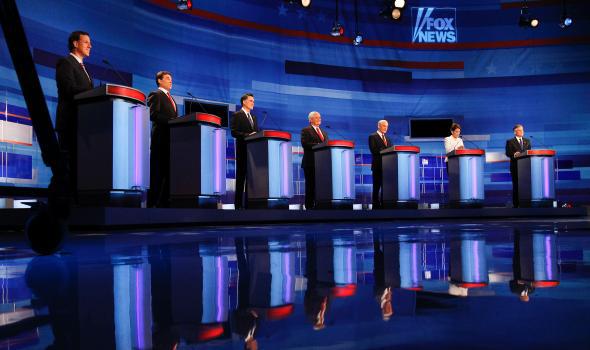The Republican National Committee has backed itself into a corner with no easy way out. Never before have more than 10 candidates squared off on stage for a televised GOP presidential debate—but by the time the first party-sanctioned event kicks off in less than three months time, there could be more than twice that number of officially declared candidates.
That reality has left the GOP in a pickle. Party officials want enough candidates on stage to avoid having it look like they’re playing favorites, but they will also need to winnow the field considerably or risk having the candidates’ opening statements followed immediately by their closing ones. How they decide to strike that balance could effectively end the dreams of as many as a dozen GOP hopefuls months before the first nominating contest even happens.
Late last week, the RNC official who chairs the debate committee suggested there could be an automatic 9-to-12-candidate cap for each debate. That plan, though, was met by near-immediate pushback from a host of GOP contenders and pretenders, and has since been ruled out completely by backtracking party officials. Other options that appear to remain on the table include using a national polling threshold for invitations (something networks have done in the past), relying on some combination of state polling, fundraising, and infrastructure factors, or even breaking each official debate into two separate heats. Either way, it’s safe to expect plenty of second-guessing from pundits and hurt feelings from politicians.
Some candidates are fretting more than others. There are eight men that currently appear destined to be standing behind a podium later this year: Jeb Bush, Scott Walker, Marco Rubio, Rand Paul, Mike Huckabee, Ted Cruz, Ben Carson, and Chris Christie are all polling above five-percent in RealClearPolitics’rolling average of national polls. After that, however, things start to get a little dicey. There’s only about one point currently separating the next six candidates, all of which have averages south of 2.5 percent: Rick Perry, Rick Santorum, John Kasich, Carly Fiorina, Bobby Jindal, and Lindsey Graham.
The situation has grown so fraught that the RNC has begun scrambling to publicly foist much of the responsibility for who get’s invited—and who doesn’t—onto the network that will televise each debate. “Ultimately, it’s the networks’ decision,” RNC spokesman Sean Spicer said over the weekend. “There’s an obligation for the party to make sure the standard is fair. But it’s not our decision.” Translation: If you don’t like what you see on stage, blame the media!
While it’s true that the networks are traditionally the ones to decide which candidates get an invite, no one expects the Republican Party to cede complete control over the guest list. The party simply has too much at stake. The debates will represent a rare chance to impose order on what promises to be a chaotic field, and the RNC can’t risk staying on the sidelines entirely.
Making matters more interesting still is the fact that party officials chose Fox News to host the first RNC-sanctioned debate, set for August 6 in Cleveland. While there’s nothing preventing CNN—which will host the second debate the following month—from inviting a candidate that Fox News excluded, anyone who doesn’t make it on stage in Cleveland is likely to lose ground to the bevy of candidates who do, making their case for standing on the CNN stage or the ones that follow that much weaker.
GOP officials, then, may not be the ones choosing debate season kings—but they may have already chosen their kingmaker. Luckily Roger Aisles has had plenty of training.
